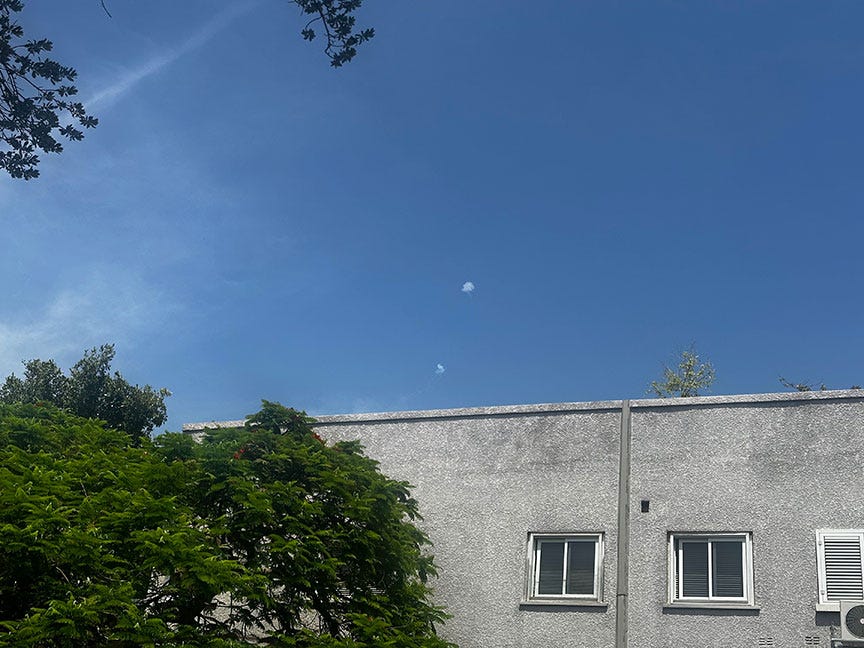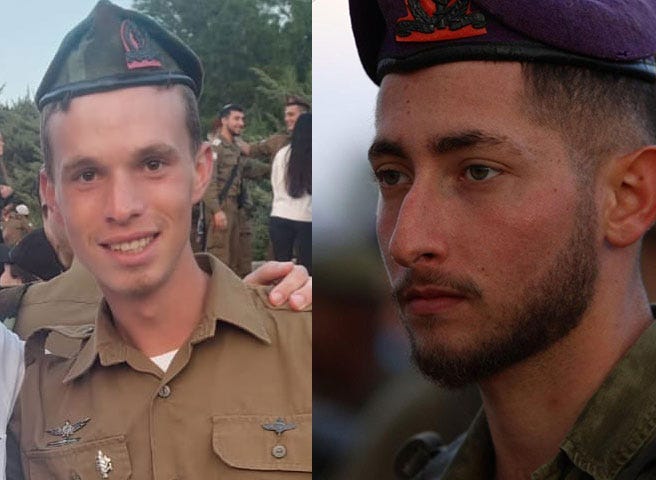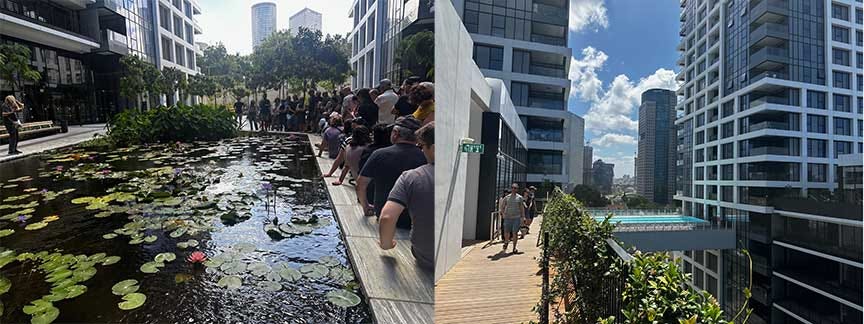DAY 233 OF THE WAR: Rocket Attack on Tel Aviv Area, Gaza Combat Continues, Intense Fighting in the North, Latest Polls
Tel Aviv Diary, May 26, 2024
Today, at 2 PM, my phone began buzzing with notifications. At first, I did not pay much attention, as it had already been a busy day with a string of attacks in the North. Then, I noticed the notification about Ra’anana. Suddenly, I started to pay close attention as the screen lit up with alerts in Herzliya, Kfar Saba, and many other nearby locations, including Tel Aviv, north of the Yarkon — meaning Ramat Aviv and the surrounding area. My immediate concern was whether the barrage of rockets was headed at us from the North (which would have been potentially serious) or from Gaza. Soon, the sounds of anti-missile launches could be clearly heard from our apartment, followed by the distinctive sound of an Iron Dome interceptor neutralizing its target.
It soon became apparent that this afternoon's rockets came from Gaza, specifically from the Rafah area. Eight rockets were fired from Gaza towards the center of the country. One rocket fell on a house in Herzliya. According to IDF sources, the rockets were fired only 800 meters from where IDF troops were operating in Rafah. It is believed that Hamas decided to use the rockets before the launchers were captured by the IDF. There are expectations that Hamas will fire additional rockets at the center of the country as IDF troops continue to advance in Rafah.
Today, rockets were fired at the center of the country — for the first time since January. Additional rockets were launched at communities around Gaza. One fell in a school parking lot; luckily, because of Lag Ba’Omer, the school was empty.
Betzalel Zvi Kovach & Sahar Sudaei
This afternoon, the IDF announced the death of Staff Sergeant Betzalel Zvi Kovach (20), who succumbed to injuries he sustained last week. Tonight, it was announced that Staff Sergeant Sahar Sudaei (20) was killed fighting in Jabaliya.
GAZA
Combat continues in Gaza, both in Rafah, where Israeli troops continue to advance carefully and in Jabaliya, where units search for additional tunnels that may contain bodies of hostages. It is anticipated that the fighting in Jabaliya will persist for several more weeks. This evening, the IDF reported that a Hamas headquarters was captured in Jabaliya, along with the seizure of numerous documents.
The IDF described today’s combat in Gaza as follows:
Division 98 forces continue fighting in the heart of Jabaliya. Combat team soldiers from Brigade 460, guided by intelligence, raided a weapons depot located inside a school in Jabaliya and found dozens of rocket components and weapons. This is further proof of Hamas's cynical use of civilian infrastructure for terror purposes, using the civilian population as human shields.
During Division 162's operations in the Rafah area, combat teams from the Givati, Nahal, and Brigade 401 eliminated terrorists who tried to attack our forces and discovered several shafts and numerous weapons, including Kalashnikovs, RPGs, grenades, and explosives.
Combat team soldiers from Brigade 679 in Division 99 continue operations in the central Gaza Strip, eliminating several terrorists.
In the past 24 hours, aircraft and fighter jets from the Air Force attacked and destroyed over 50 terror targets across the Gaza Strip. The targets included military buildings, weapon depots, rocket launchers, observation posts, terrorist cells, and other military infrastructure. During the night, two rocket launchers in the Rafah area aimed at the Kerem Shalom area were attacked.
IN THE NORTH
Beyond the events described above, the IDF reported an extremely violent day along the northern border. Last night, the IAF attacked several targets in southern Lebanon. The IAF hit several additional targets in Lebanon, resulting in nine retaliatory barrages by Hezbollah. At least nine Hezbollah members were killed in Lebanon today.
IN THE AFTERMATH OF THE ICJ’S RULING
Much to my pleasant surprise, Prime Minister Netanyahu seems to have successfully imposed discipline on all of his coalition members. None are criticizing the International Court of Justice (ICJ), and they are collectively accepting Israel’s official position — i.e., the ICJ decision only restricts actions in Rafah that could lead to genocide of the Palestinians. Despite the government’s stance, I still believe that Israel needs to take a more proactive approach to aiding the refugees who are forced to leave.
WAR CABINET MEETS
The war cabinet convened tonight to discuss the hostage negotiations. Before the meeting, Prime Minister Netanyahu issued the following statement:
While Prime Minister Netanyahu repeatedly gave the negotiating team a broad mandate to secure the release of our hostages, Sinwar continues to demand the end of the war, the withdrawal of the IDF from the Gaza Strip, and the retention of Hamas so that he can commit the atrocities of October 7 again and again. Prime Minister Netanyahu firmly opposes this.
BRITISH ELECTIONS IN JULY, TROUBLES FOR ISRAEL
The announcement of elections on July 4th in England is not good news for Israel. Current polls indicate that the Labor Party is likely to return to power. Based on what I saw during a visit to the House of Commons a month ago, Labour MPs criticized Israel, while the Conservative MPs defended it. However, a well-connected British friend in London assured me that concerns about Labour's resurgence are overstated. Additionally, there are upcoming elections for the European Parliament in three weeks. Expectations are that right-leaning parties will gain additional power in the European Union, which could work to Israel's advantage.
LATEST POLLS
Israelis do not believe that we are winning this war.
The latest Ma’ariv poll, reflects voter preferences if elections were held today:
INCITEMENT
The reserve soldier who published a video threatening to disobey the orders of the Chief of Staff and/or the Defense Minister and only follow Netanyahu’s directives was located and interrogated today. He has been dismissed from any further reserve duty. Authorities are still debating the appropriate charges. The right wing has been defending him, arguing that the reserve soldiers actions were no different from those of the Judicial reform protesters who asserted they would stop volunteering for reserve duty.
LAG BA’OMER ON MT. MERON
Mt. Meron, a popular pilgrimage destination for ultra-Orthodox on Lag Baomer, has been a frequent target of Hezbollah. Consequently, it was decided to close the site this year. Tonight, large numbers of ultra-Orthodox overwhelmed the police guarding the location to reach the site. Nineteen police officers were wounded by the crowd.
OPEN HOUSE TEL AVIV
Thursday and Friday, Tel Aviv hosted a series of Open House events throughout the city. Over the two days, more than 100 free tours were available, showcasing buildings, light rail stations, parks, apartments, and much more. Had my schedule permitted, I would have participated in dozens of different tours. Unfortunately, I only managed to attend one, which explored a new complex at the intersection of Kaplan and Leonardo Da Vinci Streets. The complex features two towers, each housing 200 apartments, alongside a ten-story office building. The tour focused on the gardens located on the ground floor, which are constructed over a five-story underground parking garage. The towers are connected by a bridge that serves as a swimming pool. The top floor of the office building is home to another garden for use by office occupants.
BUSINESS
The Israeli startup Finout, which develops a platform for managing and optimizing cloud infrastructure in organizations, raised $26.3 million in a Series-B funding round. Red Dot Capital led the round with participation from Maor Investments and existing investors Team8, Pitango, and Jibe. This brings the total investment in the company since its founding to $45 million.
Large organizations use a variety of cloud services and infrastructures, such as AWS, Azure, GCP, Datadog, Snowflake, Databricks, Kubernetes, and more. The multitude and complexity of these cloud services present significant challenges in expense management, control, budgeting, and forecasting.
Teva Pharmaceutical Industries Ltd. announced at the BioMed 2024 conference an investment of $10 million in Sanara Capital, the medical technology (Health-Tech) fund of the Sanara Group, which operates alongside Sanara Ventures. Teva has been a partner and investor in Sanara Ventures (along with Philips) for nearly a decade. This investment aligns with Teva's commitment to innovation, supporting its “Pivot to Growth” strategy and expressing confidence in the Israeli biotech and BioMed ecosystem.
Sanara Capital is a venture capital fund investing in Israeli startups in digital health, Bio-Convergence, and medical devices, primarily in A-B investment rounds following incubation. Established about two years ago, the fund has invested in six companies (three from Sanara Ventures and three external). Sanara Capital complements the established investment platform Sanara Ventures, focusing on digital health and medical devices, currently hosting around 20 startups, mainly at the Seed stage. Assaf Barnea serves as the CEO of both Sanara Ventures and Sanara Capital.
–––––∞–––––∞–––––∞–––––∞–––––∞–––––∞–––––∞–––––
A PIECE OF HISTORY
The Outbreak of the Yom Kippur War
As dawn broke on October 6th, fresh intelligence confirmed the looming conflict, suggesting the war would commence by 5 PM. Consequently, on the morning of Yom Kippur, the Israeli government initiated an urgent reserve mobilization. The Israeli Defense Forces (IDF) proposed a preemptive strike against the Egyptian and Syrian air forces, but Prime Minister Golda Meir vetoed this proposal, citing concerns about jeopardizing American support.
The conflict erupted at 2 PM when an artillery salvo of 4,000 shells targeted Israeli positions along the Bar-Lev Line at the Suez Canal. Once the bombardment ceased, Egyptian Commando units made their move, landing both along the Canal and deeper into the Sinai. These units were quickly followed by troops who crossed the Canal in small boats. The Egyptians succeeded in seizing a majority of the Israeli posts on the Canal's eastern flank. Most of the Egyptian advance took place between the forts. Israel’s plan had called for the 90 tanks that were in Sinai to be the second line of defense that would come to the aid of the forts and stop an Egyptian attack. Subsequent Israeli counterattacks were thwarted by the Egyptians, who employed anti-tank and anti-aircraft missiles. However, the gravest threat to Israel emerged on the Syrian front. A breakthrough at the Golan Heights meant Syrian forces could potentially reach the Galilee within a day, which the Syrians anticipated achieving in 24 hours.
The disparity in forces was stark. On the morning of October 6, the Syrians had a massive advantage: 1,400 tanks to Israel's 177, 115 artillery batteries against Israel's 11, and 40,000 infantry compared to Israel's 200. Against these overwhelming odds, the Israeli defense at Golan lasted a harrowing 24 hours, during which they repelled the Syrians. Though outnumbered, Israeli tankers fired more than twice as fast as their Syrian opponents and successfully hit Syrian tanks at greater distances. Nevertheless, the cost was high, with substantial territories in the Southern Golan being lost and many Israeli soldiers giving their lives to stop the Syrians. By Sunday night, the first Israeli reserve tank division began arriving, staving off further advances and eventually turning the tide against the Syrians.








